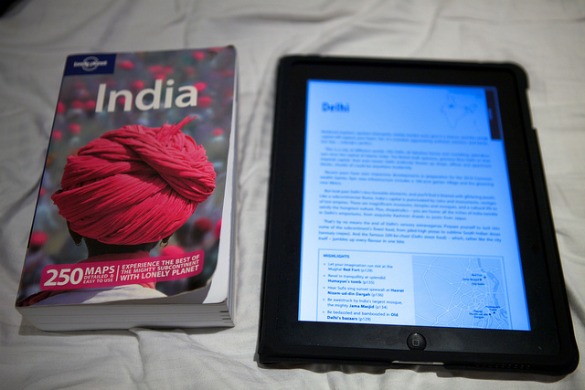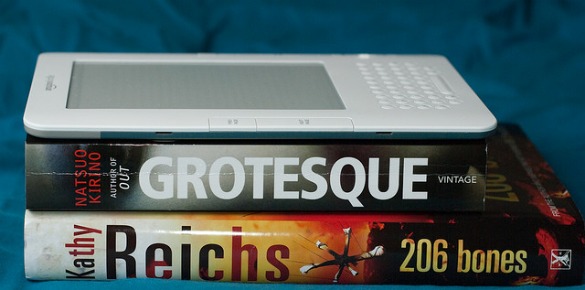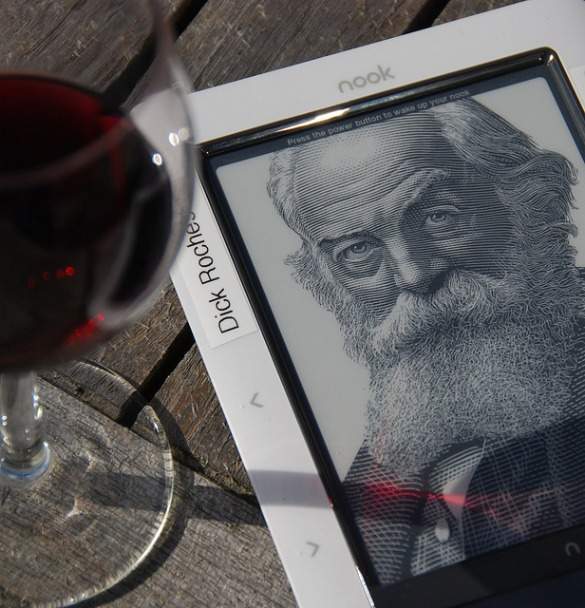Whenever a new electronic gadget hits the market, the first reaction of any veteran traveler is to wonder whether the benefit of having the new toy on the road is worth precious bag space. Is it really going to save time and effort that could better be spent on other things? What about the hassle of needing yet another plug and time to charge it? E-readers seem to be no exception; in the past few months many people have debated the value in taking an e-reader abroad or getting one before hitting the road.
After several months of road-testing my Kindle over three continents, I’m happy to report that the answer is a resounding yes. So if you’re on the fence in the e-reader revolution, here are some important reasons why it’s worth your while:
You’ll save space and weight in your bag
This is an often-touted reason to get an e-reader, but for you to fully understand the situation I want you to picture my travel backpack before and after I got my Kindle. I am a voracious reader, the sort who can get on a train with a new book and finish it a few hours later, so more often than not you’ll find me with a several hundred page tome that is a great read but weighs a ton. Add in that second book I finished but haven’t found a new home for (you can’t just throw a book away!), maybe toss in a bulky guidebook, and my backpack is starting to get really heavy.
[social]
Post-Kindle though, that weight in my backpack is gone. I have even more books with me at any given moment than I ever have before, with a few magazines and newspapers added to the mix, and changing between my current read to the bookmarked page in my guidebook can be done with the click of a button. I’m still not over the convenience after nearly a year, and my back is still thanking me.
You can get a new book anywhere. Anyone who’s backpacked through remote areas where English isn’t commonly spoken knows why this can be a godsend, as there are many parts of the world where finding a new book is next to impossible. After all the world is big, and you can easily travel for several months in areas where English is not the primary or even secondary language. Hostel book exchanges usually have very dismal opportunities for a good trade – obscure Slavic paperback or an outdated guidebook, anyone?
Once you have a good e-reader, however, this book drought is eliminated. All sorts of new books to read are just the click of a button away, and you can even read your local newspaper on days where you feel homesick. It is worth noting that many e-readers will add a surcharge for an international download depending on the country (check your plan) so it’s usually best to download your library before heading to foreign shores. Fortunately thanks to the amount of space, carrying around even hundreds of books isn’t a problem.
>> Learn how to travel very lightly
You can get free books
Not everything has to be bought from your e-reader’s store, and the most notable example are the books on Google Books or Project Gutenberg can be downloaded online for free. These projects typically cover books whose copyrights have expired,, which basically means e-readers are a great excuse to work your way through the classics. In addition to Dickens and Dumas though, be sure to check out old travel books like Mark Twain’s “Follow the Equator” for interesting travel perspectives.
Classics aside, many public library systems also now support the checking out of electronic books- they have temporary license for a book that you can download and read, and once the license expires the book returns to the library just like a normal one would. Unfortunately most e-readers haven’t yet embraced this technology due to piracy fears (plus, let’s admit, they hope you’ll buy the book instead), so if hassle-free e-books from the library are a priority be sure to do your research when choosing what brand to buy.
>> Check out great travel books that make you want to hit the road
Free wifi everywhere!
It depends on the model, but the more expensive version of the Kindle and the iPad are now equipped with free wifi wherever you go, and that includes large areas in many countries abroad. While the iPad is by far the best when it comes to online browsing capabilities, most of the other e-readers have a web browser on them as well- not good for lots of pictures, but certainly up for the challenge of text-heavy websites.
I can’t emphasize how wonderful it is to have free wifi in a strange country. Just pause for a moment and imagine my situation a few months ago when I spent a week in Paris. After flying from the USA I could shoot an email to my parents on my Kindle saying I’d arrived safely at the hostel, pause over a delicious cafe lunch to check the opening hours of the Louvre, and look up a quick French translation- all without paying outrageous roaming charges on my cell phone. I even made friends with a previously stuffy waiter who was excited to see how my new gadget worked. Tres bien!
The charge lasts an extremely long time.
One major travel concern is that “new gadget” is synonymous with “new thing I need to worry about charging,” as the last thing you want to do is add another hassle into the mix. One great thing about a paperback is you never have to worry about it dying hours into a long bus ride, right?
In my experience, fears like this for an e-reader are unfounded. With the exception of the iPad, what makes e-readers great are that they use electronic ink technology that only uses your juice when changing a page, unlike a computer screen (it also has the great effect of letting you read in direct sunlight). So if you remember to turn off the wifi capability when not using it, most e-readers are capable of going weeks or even months without requiring a recharge, and when it comes to an electronic gadget, you can’t do much better than that. Thus far I’ve always noticed hours in advance if my Kindle might need a recharge, and I’ve never seen the batteries abruptly die on me.
In short, while I’m always leery of traveling with too many gadgets at a time because I like to travel light, from now on when I go traveling I will be sure to grab my Kindle. For a new gadget it’s pretty hassle-free, and it certainly reduces the amount of weight in my backpack. I would certainly recommend one for traveling, particularly if you’re a voracious reader. And while there are certainly arguments to be made in favor of traditional books in the future, like most material arguments, the case for heavy tomes belongs at home and not on the road. Happy reading!
Buy a Kindle on Amazon: $189; Buy an iPad on Amazon: $499
Read more about reading while traveling:
- 5 Writers’ Homes for Literary Vacations
- 10 Literary Destinations to Visit with Kids
- 8 Authors Who Take You Places
Photos by: brandon shigeta, the.approximate.photographer, Gubatron, Let Ideas Compete



